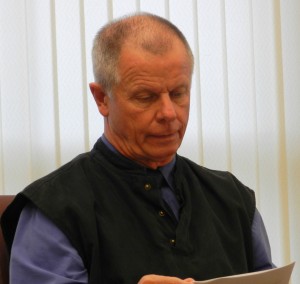
For decades now, water woes in the San Joaquin Valley have been blamed on the state and federal government and especially on the “enviros,” those effete coastal dwellers who prefer fish to people.
So it was that at last Tuesday’s Oakdale Irrigation District (OID) Board of Director’s meeting when rice farmer Robert Frobose brought up OID’s broken promises about possible impacts from annexing Trinitas Partners, General Manager Steve Knell was quick to change the subject to state and federal efforts to protect fisheries and the San Joaquin Delta ecosystem with increased flows along major rivers.
“Like most environmentalists, they want it all,” said Knell. Never mind that flow requirements for fish are established by biologists, not environmentalists. Knell was trying to divert attention away from the Trinitas annexation and other OID snafus onto what he thinks is a common enemy.
Knell didn’t want anyone remembering that earlier in the year the OID failed to complete a $3.9 million water sale because it omitted due diligence required by the California Environmental Quality Act (CEQA). And he was clearly dismayed when Linda Santos, an OID district resident, brought up OID’s failure to follow a state mandate to change voting boundaries based on changed demographics in the district.
Santos asked why the OID had hired CH2M Hill, an engineering firm frequently employed by OID, to perform the redistricting. At that point, OID Director Frank Clark decided to give Steve Knell a hand.
“I have full confidence in CH2M Hill,” said Clark, and then launched into what sounded very much like a campaign speech (he’s up for election in November). “Our enemy is not Trinitas,” he said, “Our enemy is Sacramento and that water board. Four of the five members are environmentalists and they want our water.” Clark was referring to the California State Water Resources Control Board and apparently unconscious of an irony bordering on self-parody.
Clark himself is the only non-farmer on a five member board of directors notorious for delivering water to district farmers at less than the cost of operation and maintenance. It’s Clark’s signature on the annexation agreement with Trinitas, an agreement OID and the Local Agency Formation Commission said would have no negative impacts.
It’s also Clark’s district from which most of the complaints have come about wells running dry, traffic from Trinitas’ trucks and employees, windblown dust and pesticides, and noise from industrial-sized pumps. Like the rest of OID’s Directors, Clark has supported water sales outside the district, made no moves to obey the state’s directive to realign district boundaries, raised no issues about possible negative impacts from bringing Trinitas into the district, and didn’t point out the need for a CEQA review when OID went ahead with plans for this year’s water sale.
While these issues are pertinent to OID’s membership, they are the last things management and the board of directors want to talk about. So, in the long and hallowed tradition of San Joaquin Valley water movers, OID invokes government and environmentalists as the real enemy.
There are signs that the tactic is wearing thin. When Clark said, “We’ve delivered more water than almost any district in the state and we’re being ridiculed,” Robert Frobose quickly responded, “That’s not what you’re being ridiculed about.”
And after the meeting, when asked what he thought about OID’s attempts to shift blame onto the state and federal governments, Frobose said, “They’re just trying to deflect attention away from their own mismanagement. It’s not going to work.”
Frobose might be right. In today’s drought-plagued water world, everyone is paying much more attention to how water is managed. Passing the buck isn’t going to distract anyone with a dry well, reduced water allotment, or gerrymandered district. There’s too much at stake.
